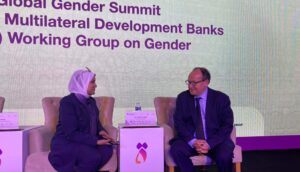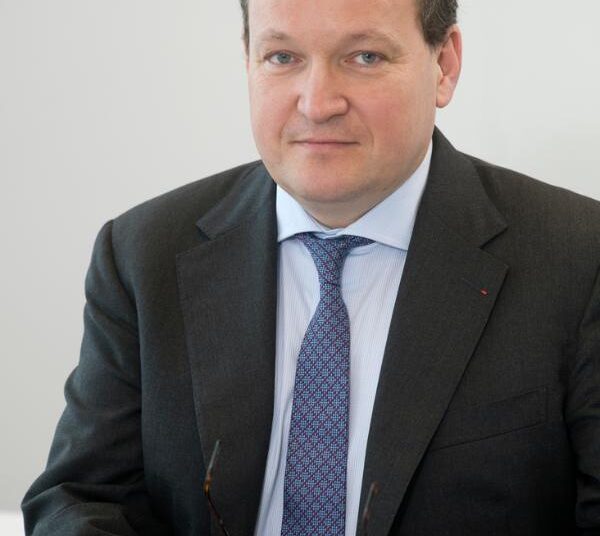The Vice President of European Investment Ban (EIB) Ambroise Fayolle has been recently in an official visit to Egypt where he met host of senior officials, including Minister of International Co-operation Rania Al Mashat.
In an interview with the Egyptian Mail, the EIB VP highlighted the diverse EIB policies along with the horizons for future co-operation with Egypt.

Climate finance a top priority
According to Fayolle, EIB has been a climate bank for a long time – as one of the world’s largest climate financier. “We also pioneered the green bonds market and adopted ambitious climate targets since years.”
In 2019, the EIB made a quantum leap forward by adopting an updated Energy Lending Policy that phased out financing to all unabated fossil fuels energy projects, including natural gas.This is in addition to announcing ambitious climate and environmental sustainability targets, which were then enshrined in the EIB Group Climate Bank Roadmap 2021-2025, approved in 2020.
This includes Increasing EIB investment in climate action and environmental sustainability to more than 50% of annual lending by 2025.
“The EIB will also Support €1 trillion of green finance in this critical decade. The bank will also Align all new activities with the Paris Agreement.”
Fayolle went on to say that with the EIB new Adaptation Plan launched at COP26 in Glasgow, the bank is committed to increase financing to climate adaptation to 15% of total EIB climate action by 2025.
It is worth mentioning that The EIB is the first MDB to become Paris-aligned since the start of 2021.” At COP26, we also launched our Paris Alignment for Counterparties framework (PATH), becoming the first multilateral bank to consider not just the climate impact of the projects it finances, but also the wider activity of borrowers.”
Gearing up for COP27
Fayolle pointed out that EIB visit to Cairo was to better understand the objectives of the Egyptian authorities and their expectations for COP27. “Many of our priorities are aligned with those of the Egyptian Presidency of the COP. For example: Adaptation, Access to Finance, Just transition, etc.”
The EIB provides support through capacity building. “For example ,we provide trainings on adaptation to the Ministry of Electricity and plan one with the Environmental Agency.”
According to Fayolle, the bank seeks to respond to some of the needs of the Egyptian authorities to support some of the initiatives/deliverables that they want to put forward at COP27.
EIB is also chairing the Heads of Multilateral Development Banks this year, and will co-host the Finance in Common Summit, a gathering of more than 500 public banks in the world, in October this year.
“This provides a particular advantage for promoting climate and environmental issues in this important year for climate action and to bring the public financial sector along to support the objectives of COP27.”
Impacts of geopolitical developments
Fayolle stressed that there is a recognition that recent geopolitical developments cast a shadow on many aspects of socio-economic development, including for energy and food security across the globe.
“However, for all the geopolitical and macroeconomic turmoil that we are facing for the moment, we cannot afford to forego our global decarbonisation and adaptation efforts. What is more: the energy and food security crises that are looming provide even more reason to accelerate the pace.”
Joining hands with Egypt
As for joint co-operation, Fayolle stressed that The EIB is among the largest IFIs operating in Egypt with a current total signature amount of EUR 7.2bn (both public and private sector) under the MFF 2014-2021.
EIB activities in Egypt have been stepping up steadily since 2014, targeting economic modernisation and entrepreneurship, trade and investment, energy security, environment and climate action, urban development and the delivery of basic services.
“Between 2014 and 2021, the average amount committed by the EIB in the country was around EUR 885m per year.”
Egypt is also the largest country of operation for the EIB in the MENA region and an important beneficiary of the Economic Resilience Initiative (ERI).
EIB investments made in the last five years are expected to result in around 797 GWh of electricity produced per year from renewable energy sources, 1.8 million people benefitting from improved sanitation, and about 183,340 jobs created or sustained in SMEs and midcaps.
In parallel, the Bank participates in regular political and policy dialogue and Team Europe coordination in order to leverage synergies and impact with other EU development partners.
The EIB is also a major partner of the EU in mobilising resources for blending with long-term loans, thus providing highly concessional financing, in addition to Technical Assistance (TA).
Examples of operations with high impact: By signing the EUR 1.1bn Urban Transport Framework loan in 2020/21 (which includes the restoration of the Alexandria tram network, the electrification of the Abu Qir-Alexandria railway and the extension of Cairo Metro Line 2), the EIB has supported three projects with significant impact in terms of sustainability and Climate Action.
Another important success story of the EIB includes the financing of a 200 MW wind farm on the west coast of the Gulf of Suez.
coastal protection in Egypt is an area in which EIB closely collaborates with national authorities, to identify potential investments in line with the Sustainable Blue Economy Finance Principles.
Fayolle pointed out that his visit included discussions with the Egyptian Ministries focused on areas of mutual interest such as the need to focus on the implementation of previous commitments despite the Ukraine crisis, to demonstrate best practices in terms of access to climate finance and private sector mobilisation, to invest in climate adaptation and biodiversity protection, and to take into account social development aspects.
Vice-President Fayolle recalled the EIB’s priorities as the EU Climate Bank and explored future opportunities of economic partnership with the government of Egypt in such domain.
Supporting Africa’s climate action
In this regard, Fayolle said that the bank investments contribute to the building of the infrastructure that helps mitigate climate change and allows Africans to adapt to its unavoidable impact on their lives.
“For example, solar-powered mobile phone towers like the ones financed in Guinea with our $30 million loan extend the network, but they also cut out diesel power.”
In 2020, the EIB provided EUR 5 billion for new private and public investment across Africa.” This represented the largest annual EIB engagement in 55 years of operations on the continent and the largest support for climate action and investment in fragile states.”






Discussion about this post